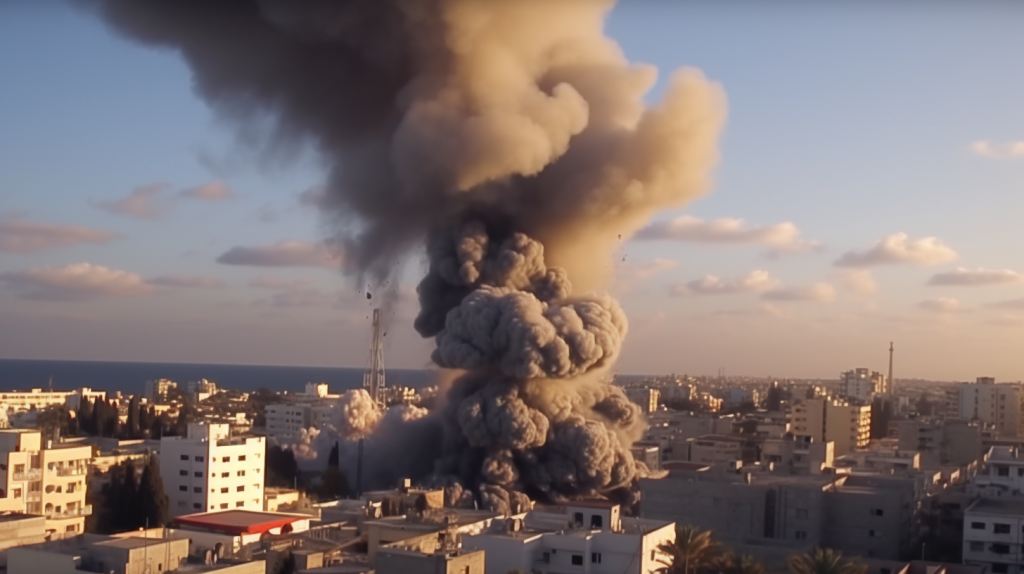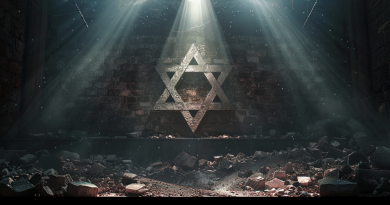Just In Time For Hanukkah, The War in Gaza Plumbs Hideous New Depths.
As with everything in the year of our lord 2023, I often find myself having to check multiple sources to verify that things on Al Gore’s internet are real. Such was also the case when I saw a clip this morning referring to leaflets that had been dropped in Gaza by Israeli aircraft, warning residents to get out or face destruction, and citing a verse from the Quran.
They wouldn’t do that, would they?
Narrator voice: They would, and … they did.
Honestly, people. I don’t know what to do with this.
But I can guarantee you this: if an Arab military power had dropped leaflets on Israel, citing a verse from the Torah and telling people to flee or face destruction, that Benjamin Netanyahu himself would have conducted some sort of arcane blood sacrifice to resurrect Meir Kahane‘s terrorist ass from the dead and have him pilot a top secret IDF Gundam to level the entire Arabian peninsula by now with those top secret Jewish space lasers MTG keeps talking about. I’m really not trying to be flippant (though I honestly wouldn’t be too surprised if the IDF did have a top secret gundam).
I just mean that this is a truly, shocking, insane thing to do– citing someone’s religion as basically demanding their unconditional surrender.
In a conflict that they’re not even participating in because they’re children.
Never mind as well that the people of Gaza have literally nowhere else to go, being stuck in an exclave surrounded by an overtly hostile power (Israel), an indifferent foreign power that is desperately trying to avoid getting involved so as to not have its ass handed to it (Egypt)– with which they share only a tiny border- and, well, the ocean.
I mention Meir Kahane, a dude who basically demanded the expulsion or murder of all Arabs from his vision of a territorially maximalist Zionist state, because his supporters continue to exist in large numbers in not only Israeli society but also in the Israeli government, and this is problematic. They are called Kahanists, and they’re basically the Israeli equivalent of the modern Republican Party (Israel has been run by a right-wing party that, like its peer parties in the United States, has been gleefully moving farther to the right over my lifetime). While some hasbara heads will defend Kahane by saying that his Kach party was outlawed so all is well in the world, adherents of the same or indistinguishable ideologies include the likes of Itamar Ben-Gvir, the current, embattled and thoroughly controversial minister of national security, who once lamented that Israeli soldiers were being hamstrung by policies that discouraged them from shooting to kill potential terrorists (n.b. “all Arab men,” basically) in non-combat situations without cause. Ben-Gvir, for his part, allegedly used to have in his home a portrait of Baruch Goldstein, a terrorist mass murderer and right-wing extremist.
This is the background for the appalling intelligence failure that led to the violence and atrocities committed by Hamas fighters on October 7th. Many of these atrocities did indeed occur, and we now know that others were exaggerated in large measure, or fabricated outright. As I explained to one hasbara reply guy on Instagram, of all places, no one should have to live in fear of physical violence. But nor should the Palestinian people have to live under the military threats and blockades, to say nothing of the IDF’s indiscriminate reign of terror over the Gaza Strip. (Hasbara guy on Instagram tried to explain why Hamas is bad and why Israel is virtuous in all things and then asked me to send him money).

War in the Context of Hanukkah
I’m struck by the profound irony of this as I read this the morning after the first night of Hanukkah, which commemorates the rededication of the temple after the Maccabean Revolt. While Christians usually think of Hanukkah as Jewish Christmas because it falls on 25 Kislev, which always falls somewhere in the orbit of the Christmas season (a holiday that also takes place on the 25th day of another month– something can’t figure as anything more than weird coincidence), it’s not a huge holiday for Jews. But it is a holiday that occurs in the winter months, and, similar to Christmas, Hanukkah is celebrated with foods that are typically winter-diet-friendly. Oily foods, especially, like latkes and sufganiyot (a donut, basically), are popular (the cooking oil-heavy foods is perhaps not just a reference to the candles burning oil, but also probably valuable in diaspora populations in which Hanukkah took place in the winter months that are far colder than they are in Israel). The famous spinning top, the dreidel (derived via Yiddish, in turn– pun perhaps intended- from the German drehen, to turn), is associated with Hanukkah, and the letters on each of the four sides are said to spell out an acronym for “a great miracle happened there” (“נס גדול היה שם”, or, nes gadol haya sham).
That great miracle happened after the Maccabeans staged a years-long revolt against the Seleucids, a Greek-ish empire that spanned a large portion of what we now call Eurasia and Western Asia (and, perhaps surprisingly for the “Greek” part, very little of what is now modern Greece). When they retook the temple, they looked for the consecrated oil so they could light candles, but found only a small quantity that was deemed appropriate (oil that had been appropriately blessed and not defiled by the Greeks). The apocryphal miracle of Hanukkah is that this tiny quantity of oil burned for eight days when it should have only lasted for a day.
The menorah has, consequently, been a symbol of Judaism and the resiliency of the Jewish people for thousands of years at this point, appearing stamped on coins as early as the Roman era.
The Maccabees In Historical/Liturgical Context
There’s a lot of interesting historiography here that I won’t get too far into except to say that the celebration of Hanukkah itself doesn’t come from the Torah, but rather from the Talmud (essentially a commentary on the Torah, to the goyim among ye). This particular tale was probably codified into Jewish law hundreds of years after this thing actually happened (whatever the actual occurrence looked like, miracle or apocryphal or not). It does not seem to come from the deuterocanonical books of the Greek and Catholic Bibles (the Protestant and Jewish Bibles, interestingly, do not include the books of 1 and 2 Maccabees).
I am bringing up this background because there is an important point that is left out of the Hanukkah narrative for obvious reasons, and probably among the reasons why 1 and 2 Maccabees were not rabinically canonized into the Jewish Bible: the Maccabeans were, well, complicated, to say the least– or, less charitably, they were kinda messed up people, the fabulous miracle of Hanukkah aside. Following the successful revolt and rededication of the temple, the group was plagued by infighting and disagreements over whether they should be satisfied with their victory, or continue to fight against the Seleucids.
At the time, there were fierce disagreements about whether Jewish people should remain effectively isolated from other cultures, or whether it was acceptable to adopt customs and cultural elements from other peoples (in this case Hellenistic influences). In many regards, this debate over assimilation vs. compatibility vs. complete separation continues to this day, especially in more conservative (Orthodox, specifically) circles of Judaism. Then, the post-Hanukkah era was marred by violence by and against the Maccabees, ironically in some cases over them trying to force non-Jews in their territory to convert to Judaism. This is a thing they did back in the day, and, for many reasons, Jews haven’t really done this in thousands of years. The question of Jewish vs. Hellenistic was rendered meaningless because the Hasmonean Dynasty founded by the Maccabees ended in the entire land being conquered by the Romans, who exploited strife and civil war to consolidate control over the region (and engage in their own barbaric brutality against Jews and others). Also interestingly, the debate over whether to separate themselves or integrate more culturally and linguistically continues to be a thorn in the side of Jewish civilization through the present day, and was foundational to the Jewish enlightenment and the birth of Reform Judaism in the 18th and 19th centuries, and was also central to the struggle of German Jewry into the 1930s (those are both stories for another day).
Hanukkah doesn’t glorify the Maccabees, to be clear. It celebrates the miracle of the oil and the rededication of the temple.
But we shouldn’t be celebrating this holiday without thinking directly about the context of it. Here’s why.
Oppression Shouldn’t Beget Oppression.
The Maccabean parable should help us celebrate the resiliency of the Jewish people against adversity and violence– a people, whether a religion, a civilization, or both, who have survived millennia of oppression and violence (committed for appallingly stupid reasons, ranging from the Spanish Inquisition to the Third Reich). But so, too, should this parable serve as a cautionary tale against militaristic pride that is blindly cheering on a campaign of violence, whether you want to call it genocide or ethnic cleansing, against the Palestinian people. It is objective fact that the Jewish people are among the most historically persecuted group of people on the planet. But this objective fact cannot be used to rationalized or hasbara away the fact that the Israeli government is actively engaged in a campaign of terror against a civilian population that is about half children.
While violence shouldn’t beget violence, it is absolutely sparking violence in a society fractured by division and instability. We are currently seeing an explosion in global antisemitism among people who are either morally and intellectually bankrupt and unable to differentiate the average Jewish person from the right-wing extremist policies being promulgated by the Israeli government. Allegations over antisemitism have thrown the entire Ivy League and much of higher education into turmoil, whether because of stupid stuff being said by university presidents, or whether because Zionist extremist megadonors demand unwavering and uncritical loyalty to the Israeli (writ-large) State.
Of course, just as state violence and settler violence beget retributive violence and anti-ethnic hatred, it’s not just antisemitism, either. Whether as a product of a long western tradition of Islamophobia, we’ve seen an explosion in anti-Muslim and anti-Arab violence, ranging from the appalling and tragic murder of Wadea Al-Fayoume, a Palestinian child in Illinois, by a Trumpy type old guy.

Misunderstanding Scripture For Bad Political Goals
The most common characterization of the “you kill one of our people, we’ll kill ten of yours” by the lay person is that it’s either 1) justified on Israel’s part, no matter how many Palestinians they kill in response, or, 2) in a mixture of resignation and misinterpretation of Torah, the idea that “an eye for an eye means that it’s justified to respond to violence with violence.” Orthodox Rabbi Joseph Telushkin, who, in his landmark volume Jewish Literacy (part of which seems to have been written, ironically, in league with noted fascist Dennis Prager), and who has a frankly shockingly uncritical attitude toward Israel, points out that the Jewish law here was effectively a revision of the Code of Hammurabi, which quite literally prescribed proportional violence as a remedy for violence. Rather, he says, Judaism, in explicitly forbidding murder or violence in most cases, suggests that the “eye” in question must be compensated with similar value. In other words, the Talmud explains to us that the Torah isn’t commanding us to quite literally extract somebody’s eyeball, but rather, it is saying that the loss of an eye must be compensated with the equivalent value of that eye.
This is a huge thing that I had misunderstood until even relatively recently in my life. Many especially evangelical Christians either write off the Old Testament entirely and cite verses like this as an example of The Barbarity Of Those People, or what have you. Jesus is the only way, they say, bragging about the divine love and grace of the Savior while uncritically encouraging a western or western-backed military to drop bombs on thousands of unsuspecting, poor brown people. It is a story as old as American 20th Century imperialism. A lot of Jews would probably interpret this characterization of the Old Testament is an example of antisemitism, and it may well be, but I think that regardless of the intent, which seems particularly hard to attribute directly, it’s definitely a misinterpretation that can parallel a lot of antisemitic tropes. It’s especially bizarre when Jews will willingly misinterpret this verse and use it– or any other Torah or Talmudic explanation- to
And it’s not a trope that we need to continue. I’m not writing this to say that we all need to become religious, by any means, or that someone is fundamentally a bad person for misinterpreting religious teachings. Rather, I’m writing this to say that my understanding of this conflict has gone from a purely academic interpretation to one that empathetically incorporates a lot of tenets of religion and spirituality. And that spirituality tells me beyond my basic human instincts that the Jewish people as well as the average human being should be appalled at what’s going on in Gaza right now.
If you’re looking at the Hanukkah story and saying, “hey, just as we triumphed against some shitty oppressors before, so, im yirtzeh hashem, shall we triumph against some shitty oppressors again.” Because the miracle of Hanukkah was not about triumphing against oppressors, and nor is today’s conflict about Israel triumphing over oppressors. And we need to remember that, or we risk becoming the people the Maccabees became– as their failings undid their society, so, too, may our failings undo ours.




